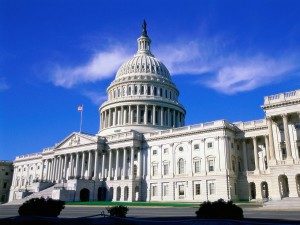
The organic community is celebrating historic wins today following Congress’s passage of the Agriculture Improvement Act of 2018, also known as the Farm Bill. The final text was released Monday evening and the Senate and House proceeded to vote swiftly on Tuesday and Wednesday, respectively, passing the bill in both houses with strong bipartisan support. The bill now awaits the President’s signature.
Among the victories in the 2018 Farm Bill is a significant increase in funding for organic research. Over the course of the next farm bill, investments in the USDA’s flagship organic research program — the Organic Research and Extension Initiative (OREI) — will increase to $50 million annually by 2023. This amount more than doubles the current level of funding and provides permanent baseline funding for this critical program, which means it’s less likely to be cut in future farm bills.
“Investing in organic research is essential to the growth and success of organic farming,” says Cara Loriz, executive director of Organic Seed Alliance. “This legislation takes a monumental step forward in helping organic farmers access cutting-edge research that supports their success and the sustainability of our food and farming systems. We’re grateful that Congress agrees that now is the time to bolster funding for this critical area of research.”
While overall funding for agricultural research has grown over the years, funding for organic research has stagnated at a time when demand for organically produced food and other products is growing. Organic research benefits organic growers looking to fill this demand, and supports the success of transitioning farmers who often face a steep learning curve when adopting organic production practices. Because organic research often focuses on soil health and alternative pest and disease management, the results benefit all farmers — not just organic.
The 2018 Farm Bill passed today funds the OREI program at $20 million in 2019 and 2020, $25 million in 2021, $30 million in 2022, and $50 million in 2023 and subsequent years.
There are other wins for organic farmers, including:
- Authorization and funding for the National Organic Cost Share Program, which provides partial reimbursement of certification costs.
- An expansion of resources and authority for the National Organic Program (NOP) to enhance organic import enforcement and deter fraud in the marketplace.
- Funding for organic data collection, which provides critical information to policymakers, advocates, researchers, and industry members to track trends and address needs.
Organic Seed Alliance was a strong advocate of the Seeds for the Future Act, a marker bill that aimed to ensure that federal investments are sufficient to support farmers and researchers in developing plant varieties that are “farmer-ready” and regionally adapted to meet the needs of diverse farming systems and markets. While this marker bill didn’t make it into the final text, we’re pleased to see related provisions included. For example, the final bill:
- Directs the USDA to conduct a strategic germplasm collection and cultivar assessment, and to develop a plan that takes into consideration the resources and research necessary to keep the existing national collection viable and accessible.
- Requires that at least four members of the National Genetic Resources Advisory Council (NGRAC) have expertise in public plant or animal breeding.
- Directs NGRAC to analyze existing cultivar research investments and resources needed to meet future breeding challenges; research gaps related to cultivar development; assess the state of commercialized federally funded cultivars; and identify appropriate levels of funding for addressing cultivar needs for underserved crops and geographies.
Other positive outcomes in the 2018 Farm Bill include: continued funding of the Specialty Crops Block Grant program; the creation of the Local Agriculture Market Program; policy improvements to the Beginning Farmer and Rancher Development Program; and permanent funding for the Farming Opportunity Training and Outreach (FOTO) program, which provides much needed support for beginning and socially disadvantaged farmers.
“Organic Seed Alliance applauds Congress’s passage of the 2018 Farm Bill, ” says Kiki Hubbard, advocacy director for Organic Seed Alliance. “Though not perfect, we appreciate the bipartisan support and leadership of the Senate and House agriculture committees in ensuring this legislation crosses the finish line before the end of the year. We look forward to working with the administration in implementing these policy changes to support the viability of organic agriculture, our nation’s seed collections, and our public plant breeding infrastructure.”
Contact: Kiki Hubbard, (406) 544-8946
